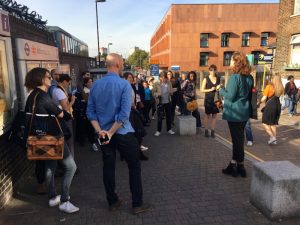Whitstable Biennale 2018
Swimming Home
2 – 10 June
The 2018 Whitstable Biennale brings the most exciting experimental and emerging art to Whitstable, with live performances, film screenings, sound works, and the written word woven into the fabric of the town, with major new commissions, exhibitions and film premieres.
Art will be dotted around the town making new routes to explore for those who don’t know Whitstable, whilst creating radical and uncanny shifts within familiar spaces for those who do. From a Victorian Sea Scouts Hall to Whitstable’s only DVD/Comic shop, the Biennale will take over curious buildings and unusual spaces. Artworks will be located on the streets, on the beach, and in the harbour – inside boat sheds and even on a mysterious spit of land only visible at low tide.
Taking its title from Booker-shortlisted novel Swimming Home by acclaimed writer Deborah Levy, many of the works in the Biennale are a response to the rhythms of the tide and a reflection on the ocean, exploring ideas of where home might be and thoughts of being at sea or in exile. Many of the works also touch on issues of identity and the movement and instability of languages, food, cargo and people. Deborah Levy, own inspiration was drawn from John Cheever’s book The Swimmer which was later made into a film starring Burt Lancaster, and Levy herself will create a new, limited-edition text for the biennale, which she shall read from and distribute to Biennale attendees.
Artist Sophie Lee’s sound work is inspired by a 12th century mystic and will be broadcast from the bell tower at St Alphege; Jude Crilly’s biodegradable sculpture will attract a mass of seagulls and Alice Theobald’s live performance with two choirs will be staged on the artificial greens of the Oyster Indoor Bowls Club. Meanwhile, Hannah Lees will be working with art and food, transforming Whitstable’s Horsebridge café with new décor and new dishes.
Photo-based artist Sarah Dobai is working with acclaimed writer Tom McCarthy on a new performance work that will take place in vitrine-like spaces, reminiscent of the acoustic pods that are found in office environments. These spaces, designed to demarcate space and create privacy in reality turn the people inside into objects on display. The performance will take the form of live fashion shoot with photographic film lights and live models performing inside the glass pods.
Leigh Clarke’s exhibition The Syrian draws on the work of W H Bossons – a Cheshire manufacturer of kitsch ceramic wall hangings including Bossons Heads. The heads featured caricatures of wildlife, Dickensian characters and indigenous people drawn from the pages of National Geographic magazine. Clarke who remembers these from his 1970s childhood has created an uncanny installation based on the most produced and least politically correct heads from the Bossons catalogue – that of the Syrian man. Clarke will strip back the originals revealing faceless heads, removing their identities and making reference to how British society has represented Syria from the age of Lawrence of Arabia to the current humanitarian crisis.
Major new commissions include an installation by Kihlberg and Henry that explores slow violence in the city. Slow violence – a term originally used to describe imperceptibly slow, environmental degradation – is applied to the urban environment. Their film installation explores the slow grinding assault of the construction industry as buildings go up and down, hoardings display idealised images of proposed new developments and discarded cigarette packets warn of myriad deaths. The work has an intense, rhythmic force as the narrative is disrupted by the repetitive invasive beat of music blasting out of a car and images cut to black.
Showing for the second time at Whitstable, artist Sarah Wood will work with found footage, making films from other people’s films – an act of reclamation and reinterpretation. In Memory of the Future a two-screen essay she reactivates old footage re-examining the shooting that triggered protests across Europe in 1968 in the light of current political realities. Phoebe Cunningham uses the mechanisms of filmmaking, actors, existing scripts and autocues to examine the creation of political characters through PR and spin in a work that is part installation – part performance.
A performance lecture by Margareta Kern brings together telegraphic maps, corporate archives, nautical charts, sea monsters, planning applications, and wireless frequencies whilst Caroline Bergvall’s spokenword performance combines singing with field recordings of nightingales and invites a scholar, a poet, a calligrapher and an ornithologist to address questions of how language travels and how love poetry crosses histories.
The film programme will include Lek and the Dogs a film by Andrew Kotting loosely inspired by the true story of a four-year-old Moscow boy who ran away and lived for 2 years with wild dogs on the streets. Also on show will be three modern classics directed by Lindsay Anderson, with a screenplay by David Sherwin and starring Malcolm McDowell [If (1968), O Lucky Man! (1973) and Britannia Hospital (1982)]. These films are screened in memory of the screenwriter David Sherwin (1942 – 2018).
Artist-led walks take you through hidden alleyways and marshy edge lands or combine with discussions in The Walking Reading Group. Visitors are invited to go foraging with local bird experts or join a surreal dining experience in a restaurant in the Labour Club. Performances on the beach and in beach huts utilise sound, music, readings and the moving body and work directly with the environment: the beach itself, wind, water tides, found objects and local field recordings.
With over 20 events across eight days, audiences will come together to re-imagine Whitstable, seeing something new each day and experiencing works in close proximity and in unexpected locations.
In parallel to the main festival, Whitstable Biennale will also host a fringe Satellite Programme, presenting new work by creative practitioners from across Kent and beyond.


